“I see contradictory attitudes towards Belarusians.” Hot topics at Kyiv press conference
The National Union of Journalists of Ukraine (NUJU) organized a round-table discussion in Kyiv about repressions and the situation with the independent media in Belarus. But the debate among the participants continued on other important issues, mainly the representation of Belarus and Belarusians in the Ukrainian media and why it is beneficial for Belarusians and Ukrainians to support each other despite the factors that drive them apart.
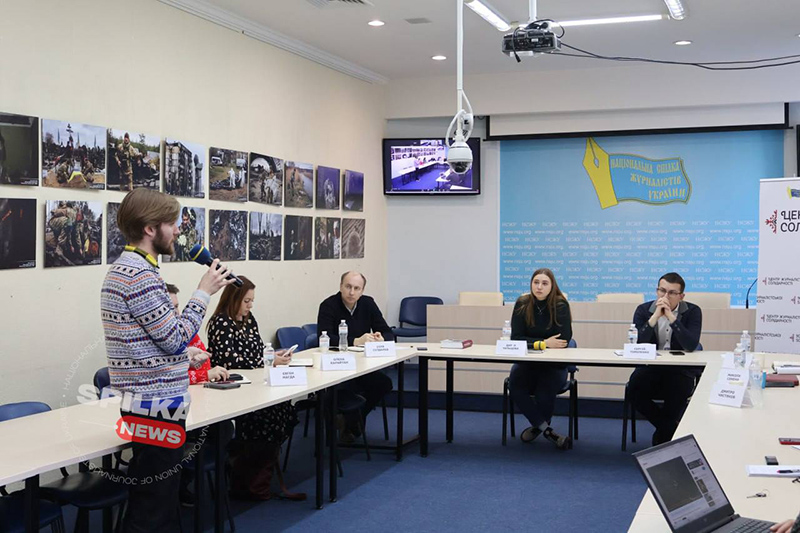 The Ukrainian side at the meeting was represented by the NUJU chairman Serhii Tamilenko, famous Ukrainian political analyst Yevhen Mahda, and journalists and media editors. Daria Chultsova and Ales Minau, both former political prisoners and journalists, as well as deputy chairman of the Belarusian Association of Journalists Barys Haretski, came to speak from the Belarusian side.
The Ukrainian side at the meeting was represented by the NUJU chairman Serhii Tamilenko, famous Ukrainian political analyst Yevhen Mahda, and journalists and media editors. Daria Chultsova and Ales Minau, both former political prisoners and journalists, as well as deputy chairman of the Belarusian Association of Journalists Barys Haretski, came to speak from the Belarusian side.
Regular convicts initially saw political prisoners as “aliens”
In recent years, the influence of Russian politics has distanced Belarusians and Ukrainians, despite their traditional closeness. We sometimes learned about certain developments in the two countries through the distorted mirror of Russian propaganda.
We must honestly admit that we, Ukrainians and Belarusians, know too little about each other.
For almost three years, brutal repression has been going on in Belarus, primarily against civil society. Thirty-five journalists are being held captive, and over 1,400 people have been recognized as political prisoners. However, Ukrainian society is mostly unaware of what is really going on in our country.
Much of Ukrainian society is unaware of the criminalization of journalism in Belarus. And the story of Belsat TV correspondent Daria Chultsova, who spent two years in a correctional facility, comes as a shock to many in Kyiv:
“When I got to the penitentiary, they put a lot of pressure on me – to extort a guilty plea, to make me sign a petition for clemency. Almost every day the administration wanted to see me. They exerted psychological pressure, threatened me with filing violation reports and placing me in a punishment cell. There’s a special block where they put those who should stay under more pressure than others. At first, my friend Katsiaryna Andreyeva (Bakhvalava) was there.”
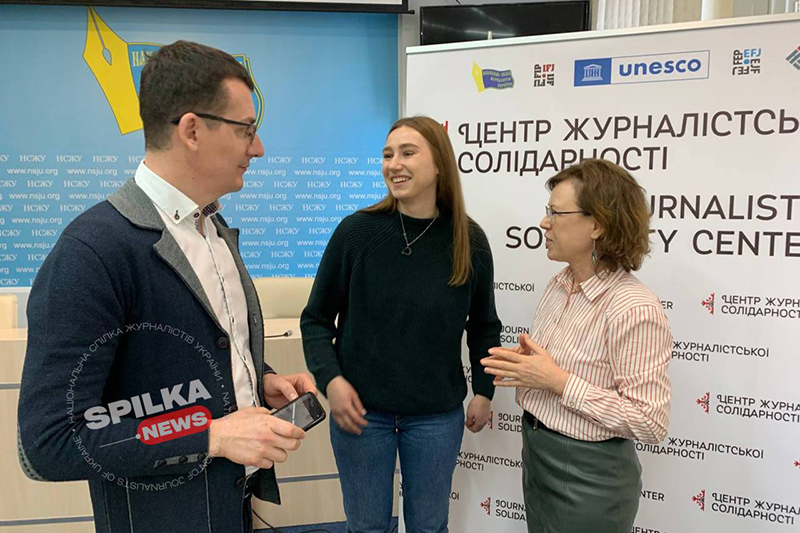
According to the Belarusian journalist, in prison she stayed among the convicts sentenced for murder, selling drugs, and evasion of paying alimony. At first, they saw political prisoners as «aliens.» But over time they realized that these were normal people, despite the label «prone to extremism» that many political prisoners are assigned in prison.
“They treated us just fine, except when the administration asked them to do something provocative in relation to political prisoners. Such provocations were abundant,” Daria Chultsova shared.
Admittedly, she felt supported by letters she received from strangers.
However, after the outbreak of war in Ukraine, the penitentiary system began allowing letters only from family, while reducing the number of phone calls allowed and increasing pressure.
“Few journalists find the strength to return to their profession after being prosecuted. What can we do to speed up the release of the rest of our Belarusian colleagues?” Ukrainian journalists asked Daria Chultsova.
“I think things will change if Ukraine wins the war. That is the most likely and quickest scenario. Otherwise, it is impossible. The sanctions aren’t working. People are being arrested against all odds,” replied the Belsat TV correspondent.
She also noted that after she has seen the system from the inside she could not keep quiet about the illegal convictions and humiliation of people, violation of freedom of speech and human dignity.
“It is important for Ukrainians to have a friend in the North, not an enemy”
Continuing the sad theme, the deputy chairman of the Belarusian Association of Journalists, Barys Haretski, emphasized that repression does not stop when a person has already been unjustly convicted.
This happened to another Belsat TV journalist, Katsiaryna Andreyeva (Bakhvalava), who was detained when covering protests along with Daria Chultsova. When she was already in jail, an additional criminal case was brought against her and the sentence was extended by eight more years.
“The regime first liquidated BAJ and then recognized it as an extremist formation, like most independent media,” recalls Barys Haretski. “For any kind of cooperation with the media, a person can be sentenced to two to six years in prison – for commenting, sharing or sending a photo. Unfortunately, there are many such cases”.
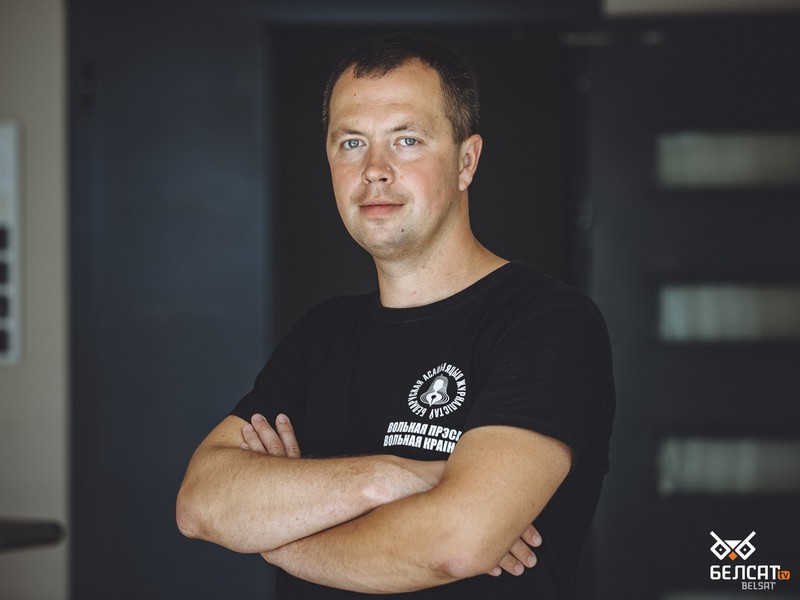
One of the sad examples is the conviction of another former Belsat TV journalist, Iryna Slaunikava, who allegedly promoted extremist activities, i.e. the work of the channel.
“Why do I think that Ukrainian society needs to know about the situation in Belarus?”, the BAJ deputy chairman raised an important issue. “It is a mistake to ignore it because the strategic task of Russia is to make people see Belarus as a part of Russia. I’m sure that Ukraine and Ukrainians are interested in having a democratic, pro-European neighbor. Both for political and economic reasons and, above all, for security reasons. So that there is no gray zone or satellite of tyranny in the north. This may not be articulated in Ukrainian society at the moment – there is a war going on – but Ukrainians benefit from a European Belarus without a dictatorship.”
This point of view was supported by Yevhen Mahda, director of the Institute of World Policy (Ukraine):
“When people are trying to equate Belarusians and Russians, they are helping Russia. From the first days of the war, I kept saying that the participation of Belarusian troops was unacceptable. I communicated it to the Belarusian and Ukrainian media. It’s a good thing that this did not happen. Belarusian-Ukrainian relations are currently frozen. The hoarfrost is there, but hot steam gets through at random. The involvement of Belarusian troops will ruin relations between the peoples for years to come».
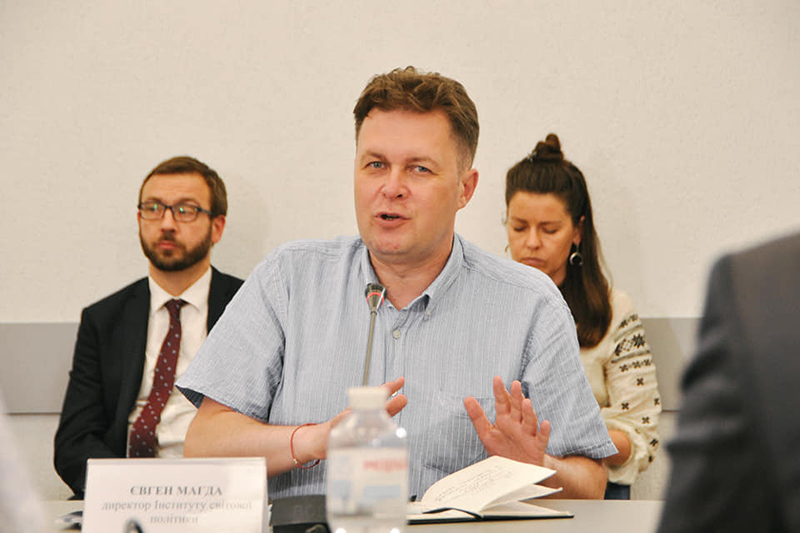
“Ukrainian media fail to report on Belarusians who do not support the war”
Meanwhile, says Barys Haretski, many Ukrainian media tend to remain silent about developments in Belarus. They say it is a gray area and claim to be uninterested in what is happening there.
In this regard, we can recall the controversial reaction of Ukrainian media and politicians to the awarding of the Nobel Prize to Ales Bialiatski, as well as the selective translation of Joe Biden’s speech in Warsaw.
“I’ve been working in Ukraine since the end of 2021 and I communicate a lot with people and see contradictory attitudes towards Belarusians: they are either very good or very bad,” Belarusian journalist Ales Minau shared his experience. “When people who survived the atrocities say, ‘We sympathize with you, Belarusians,’ it’s impressive. Then I ask, ‘How do you know about our situation?’ No one replied that they had heard about it from the Ukrainian media”.
Within 10–15 minutes, the reporter said, he could convince those who had a negative attitude towards Belarusians.
“At the same time, the Ukrainian media fail to report on Belarusians who do not support the war,” he stressed.
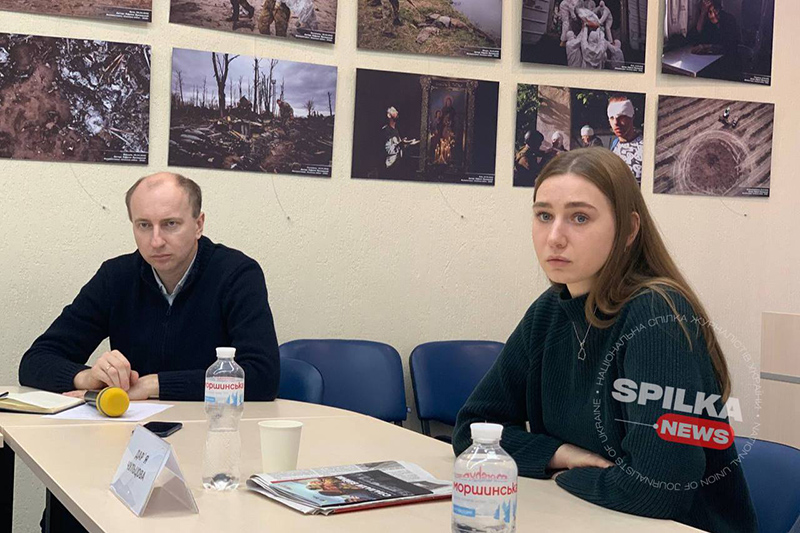
It is worth noting several other myths that prevail in Ukrainian society: supposedly, the majority of Belarusians support the war, Putin, and Lukashenka. However, research by independent sociologists suggests the opposite.
“This attitude has formed because from March to October 2022, missiles were launched from the territory of Belarus and the Russian troops entered from there,” explained Yevhen Mahda. “But we cannot say that the Republic of Belarus fully supports Russia’s actions”.
The political analyst emphasized the importance of disseminating truthful information about Ukraine in the Belarusian media:
“Independent sociologists conducted a study and found that the Belarusian diaspora is in close contact with their compatriots, friends and relatives. About 5% of the Belarusian population has left the country, while the majority remains. We must try to tell them the truth.”
During the discussion, the idea of creating a Belarusian-Ukrainian media was raised, which could be a point of common interest. This is not a new idea. However, this initiative now comes from below and seems to have much more prospects.
“I urge you not to turn out the light, to cover the developments in the face of darkness”
The Belarusian media community was probably one of the first to respond to the Russian invasion of Ukraine with both objective coverages of the war and support for Ukrainian colleagues.
“I remember well many Belarusian journalists texting and emailing us,” confirmed Lina Kushch, first secretary of the National Union of Journalists of Ukraine. “They all had the same question: how to help? We know very well that independent media in Belarus oppose the war and support our country”.
She noted that it is a big mistake to equate the people and the regime in Belarus.
“There have never been easy times in Belarusian journalism,” added Barys Haretski. “Now, however, the media sector is facing an extremely difficult test. Journalists keep spreading truthful and accurate information about Ukraine, even if it is an unpleasant and sore topic for Belarusians.”
He also recalled that many Belarusian journalists were based in Chernihiv, Kyiv and Lviv when the Russian invasion started.
“Lately, the law enforcement officers have started raiding journalists’ homes at night,” BAJ deputy chairman once again turned to the Belarusian theme. “This is what evil dictatorships love – to work in the dark, when nothing is seen and remains unclear. Journalism, on the contrary, brings light. Only then one can make informed decisions. I urge you to keep the light on and to keep reporting on the developments. Then the myths that arise from a lack of information will not have a chance.
The Belarusian Association of Journalists expresses its sincere gratitude to the National Union of Journalists of Ukraine for many years of solidarity, cooperation and support and declares unconditional solidarity with all Ukrainian colleagues!
Journalists matter!
Read more:
Rehijanalnaja Hazeta’s editor-in-chief criminally charged and put in custody
Journalists Padabed and Lazarau recognised as political prisoners
Jamie Fly, Radio Liberty president: “We’ll go back to Minsk to reopen our office. It’s just a matter of time”
 @bajmedia
@bajmedia
